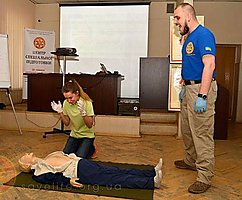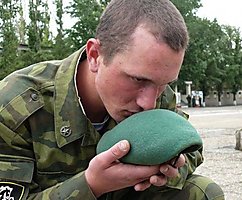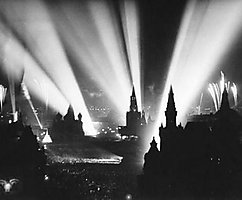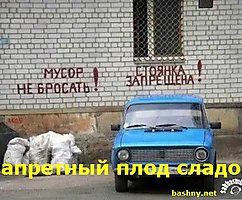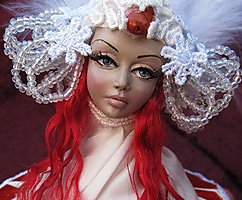10 Communist societies that preceded the Soviet Union
 Bashny.Net
Bashny.Net
The principle of "from each according to his ability, to each according to his needs" people used long before the advent of the Communists. 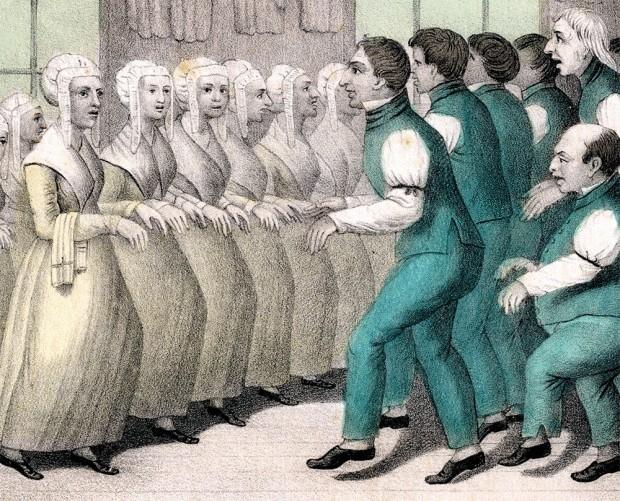
© www.americanantiquarian.or
Karl Marx outlined his theories of a classless society with common property in the pamphlet "the Communist Manifesto". In Russia, in the days of Lenin, the plan was first implemented in the whole country. However, the idea of such a society was by no means new. Throughout human history different people have organized their lives according to Communist principles.
1. Prehistoric people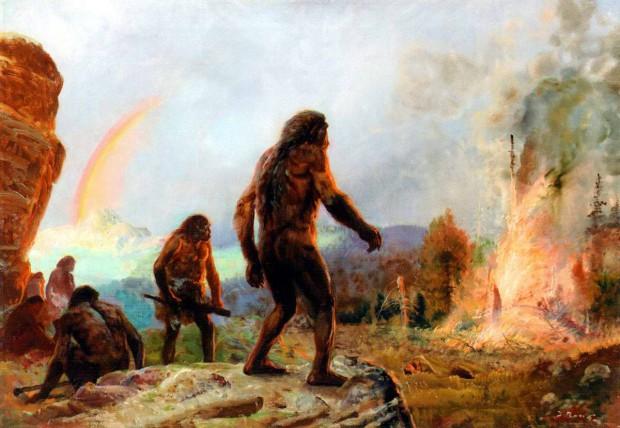
© tipolog.livejournal.com
In a world where production of goods is so low that it can barely meet only the most urgent needs, people tend not to exploit each other for profit. People lived by hunting and gathering, and the basis of division of labour lay biology: physically strong men hunted while women cared for the household and raising children. Hunting was a collective activity, and the property was shared. In a world where everyone is fighting for survival, the exchange of everything necessary for survival was the norm. There was no concept of "state". No classes existed. If had quarrelled, it was a quarrel between the individual members of the tribe. The main role in resolving such quarrels were played by the elderly as they had more life experience, but they were not leaders in the usual sense of the word. Their role is well defined one leader of the Visigoths, who once said: "I Have authority but no power".
2. The Pythagoreans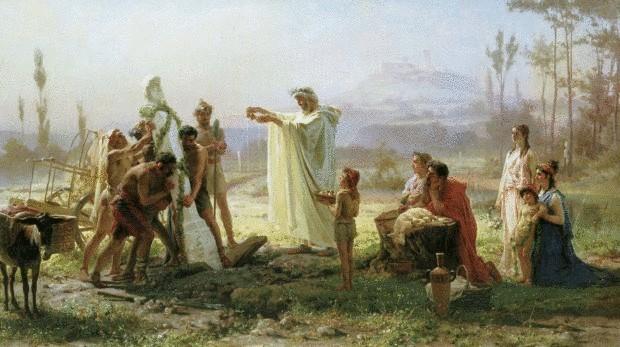
© www.oursociety.ru
The Greek philosopher Pythagoras once held of the Communist experiment in Croton, in southern Italy. He combined the monastic order and the University. The Pythagoreans were mystics who believed in the harmony of the Universe. And they believed that private property could destroy the harmony, because it creates social injustice.
Pythagoras considered a grave sin, the enjoyment of wealth and comfort while others suffer deprivation. The members of the society of Pythagoras did not recognize private property and were strict vegetarians. According to Plato, Pythagoras said: "Friends share everything" and "Friendship is equality". His disciples shared even personal things, for example, Cutlery. Newcomers who came to the society, supposedly taken a vow of silence for a period of 5 years. In fact, the Pythagoreans were so secretive in everything that touched their practices and beliefs that even Pythagoras himself left no written evidence about them.
3. Sparta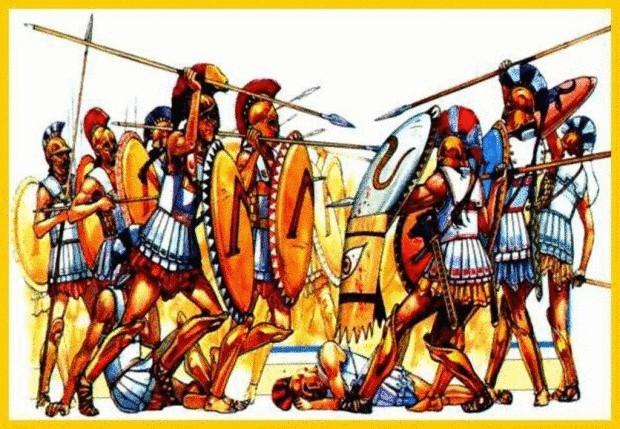
© allanick.rusedu.net
Athens is considered the cradle of democracy, and the clash of the Greeks with a clearly Communist Sparta was a bit reminiscent of the rivalry between the two great powers in the 20th century. System of government in Sparta was designed in a way to create city-States United into an effective military machine. And the man was important only as a tool of the state. All Spartans considered themselves equal. Although the Spartans had a little private family ownership most of the land belonged to the state. In order to prevent the Spartans to acquire wealth, one of the reformers, Lycurgus, decided that Sparta will not be gold or silver money. Money in Sparta was iron. Because outside of Sparta, these "money" had no real value (but weighed a lot), the Spartans actually had no monetary wealth. The prohibition of wealth was pursued quite specific goal: to get people to ask for financial support to the state and not to their families. A state machine, in turn, would form them into brave warriors, fully dedicated to the state.
4. The Essenes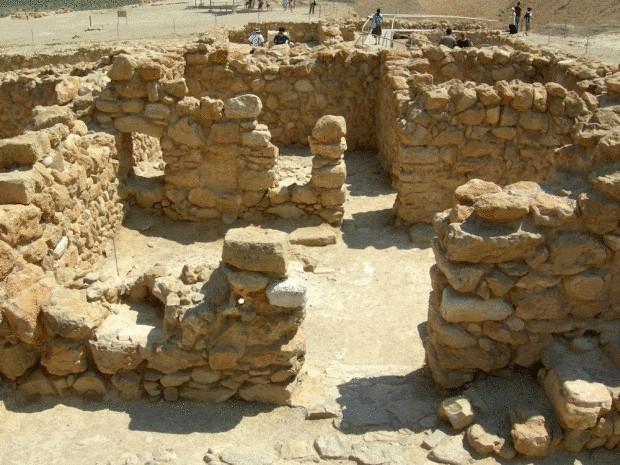
© Wikimedia
The Essenes is a pre-Christian Jewish sect, the communities which were located in the area of the Dead sea, and the most famous of them is called Qumran. It was there that he discovered the Dead sea scrolls. Once the Essenes separated themselves from mainstream Jewish society, because they believed that it is nothing but carnal pleasures and corruption. They considered themselves a community of the righteous, God's true elect, who devoted their lives to purity, virtue, and strict observance of the law of Moses. Their devotion to this law was so fanatical that according to the historian Josephus, they even in a toilet on Saturday did not go. It was an apocalyptic sect living in anticipation of the upcoming war between the sons of Light and sons of Darkness. Their asceticism was to prepare them for the coming conflict in which they had to take the side of Light. However, in the real world, the Essenes were pacifists, and refused to carry weapons. In their communities there were no women. All their property was in the General Fund, they openly despised wealth, while voluntary poverty was considered a virtue. Their clothes and sandals they wore as long as they don't break apart. Having servants was strictly forbidden. The community resembled a family are equal, and the leaders of the community were chosen by voting. Farming and agriculture the Essenes mastered to such an extent that could get the crop in any, even very arid region, and this harvest was enough for the whole community. They used a complex system of irrigation and the accumulated rain water stored in large tanks. The resulting harvest was transferred to a Manager and was then used by all as needed.
5. Early Christianity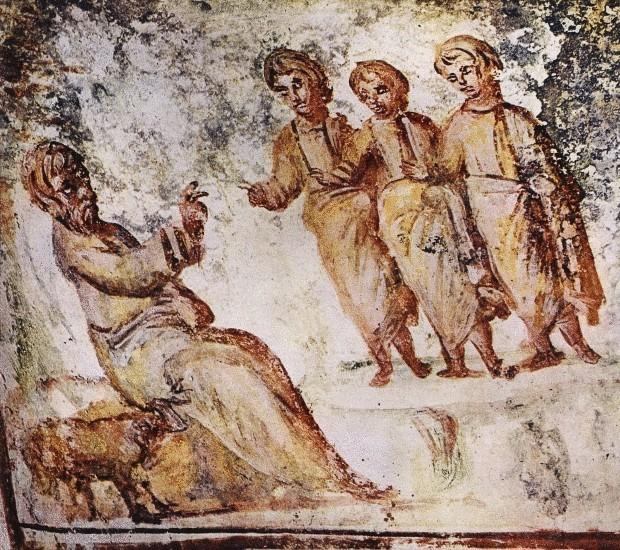
© www.thejesusvirus.org
Age of primitive early Christianity was not long, as the Church quickly adapted to the economic and social structure of the Roman Empire. However, the term "communism" is quite applicable to an individual monastic orders, which were circulated in Egypt and in Asia Minor. All material assets in such order of monks usually kept together, and in General, in early Christian monasticism was hailed serious austerity, and luxury was considered worthy of contempt. But over time, in the West of SV. Benedict was allowed to make some concessions in the monastic life, and monasteries were allowed to own property. However, even then, remained the distribution of goods according to the principle "to each according to his needs." The monks wore the standard clothes made with funds from the General Fund. At the head of the monastery was the Abbot, but all the important decisions he took only after discussing them with the other monks. All monks were equal in status, whether they were of noble origin or peasant. As soon as they entered the monastery, they are, in fact, born anew, leaving behind their former worldly life.
6. The tzaddik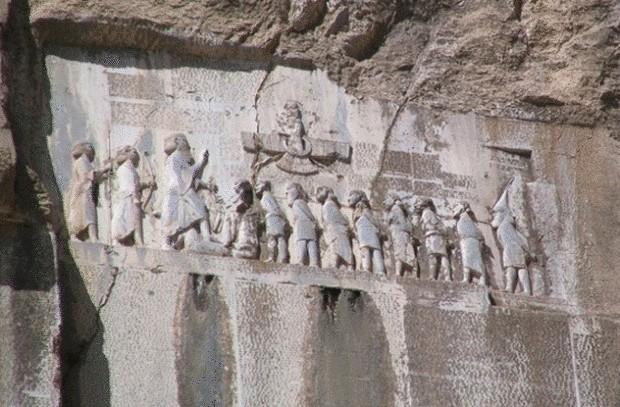
© Wikimedia
The tzaddik is the members of a religious movement that existed in the mid-fifth century. They sought to convert to the Zoroastrian religion of Persia, with its influential and wealthy clergy. And they were led by a priest named Mazdak, who preach social justice and equality. He taught that God created material goods to ensure that they are equally distributed among all. But because this rule was broken, and turned into the exploitation of the poor by the rich, Mazdak taught that you have to Rob the rich to help the poor, and thus restore the lost balance in the distribution of wealth. The tzaddik regularly plundered the warehouses, and gave the loot to the poor, and all kinds of threatened property of the rich. According to Mazdak, such actions were necessary and in order to fight the "Five Demons", such as Envy, Anger, Vindictiveness, Greed and Greed. Mazdak proposed to get rid of big wealth, to get rid of social differences and to create public charitable institutions. In the end, Mazdak and 3000 of his followers were captured, then Mazdak was forced to watch as his disciples buried alive, head down. And then he was hung upside down and shot with bows and arrows.
7. The Butler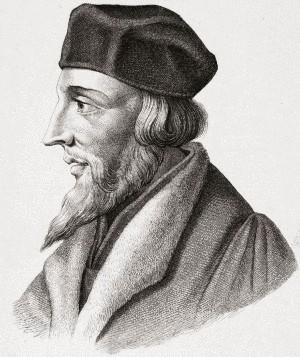
Jan HUS / © czechmeout.wordpress.com
Jan HUS, a teacher at Prague University, protested against the Church, which, in his opinion, more and more engaged in worldly Affairs. He pointed to socio-economic chaos in Bohemia as one of the signs of the imminent coming of the Antichrist. His constant attacks on the Church led to the fact that he was accused of heresy and burned alive in 1415, the year. After this his followers the "Hussites", was divided into moderates and extremists, which became known as the Butler. The name comes from the town of Tabor, which they founded, and which has tried to prepare spiritually for the inevitable end of the world. Taborites sought to build a utopian society underpinned by the axiom "neither mine nor your", that is, the negation of any private property. In his article in 1420, the year the Butler made it clear: "We don't need no king, no Lord, as there should not be slavery. All taxes and other claims must cease, as no one should force someone into submission. Everyone should be equal, like brothers and sisters."
8. The Anabaptists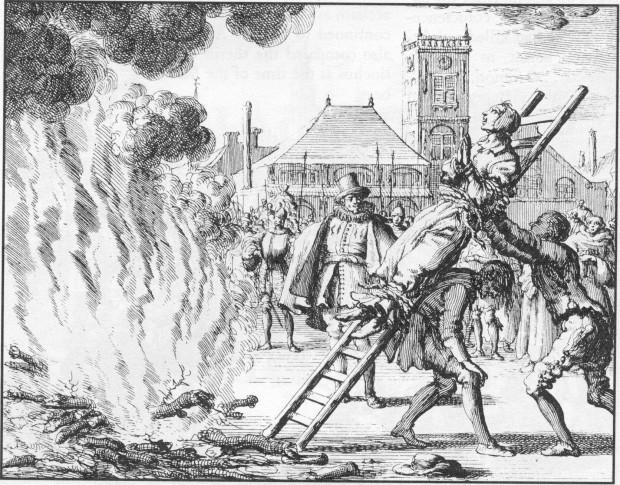
© holyspiritactivism.wordpress.com
The Anabaptists (meaning "baptized again") considered themselves to be elected. The radical wing of the sect sought to capture political power and establish a new society in accordance with their ideas about it. The first head of this wing was Thomas müntzer, who really was influenced by the "communism" of the Hussites, and who was willing to spread their ideology throughout Germany, even if it have to do with fire and sword. Even Martin Luther, another prominent figure of the time, the thought of Munzer extremely dangerous man. In 1525, the year munzer seized power in a town called Mulhausen, and set up a Communist regime, seizing monasteries and destroying private property. As a result, according to a contemporary, "he so influenced the people that nobody wanted to work." Communism in that situation was the justification for outright robbery. "When someone needed food or clothing he went to a rich man and demanded it all in the name of Christ, for Christ had commanded all to share with the needy. And that could not be obtained freely is taken by force. Many acted this way. Thomas [müntzer] started this robbery, and increased it every day."
9. Диггеры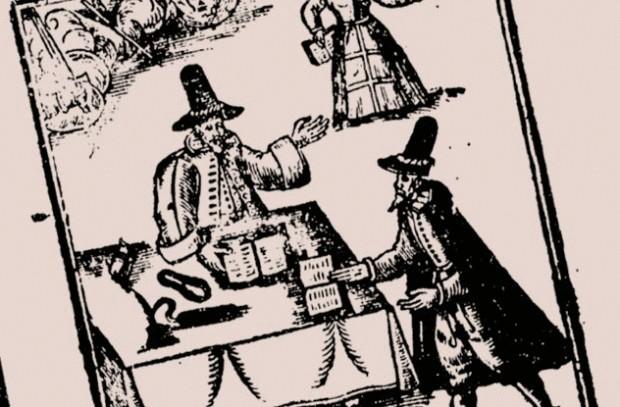
The effects of civil war in England began mass unemployment and hunger due to crop failure. Against this background, economic and social instability there was a movement that advocated the destruction of private property and for ensuring the common property for all residents of Central and southern England. These agrarian Communists called themselves diggers. They tried to take away land from the nobility, and as a first step towards this goal, they proposed to remove the monarchy and create a plot of Commonwealth. In 1648, the year appeared a pamphlet calling for the destruction of the nobility, and an equal distribution of wealth. The world of the diggers was considered as a "common Treasury." Gradually, there were growing communities of the diggers, the largest of these was the community of George hill. However, the radical idea of the diggers were not recognized by the rich. They were subjected to legal harassment, boycotted them, and eventually came to direct violence. Dilerskie the settlements were burned, their culture was completely destroyed. By the end of 1650, the year of the diggers movement was finally crushed.
10. Shakers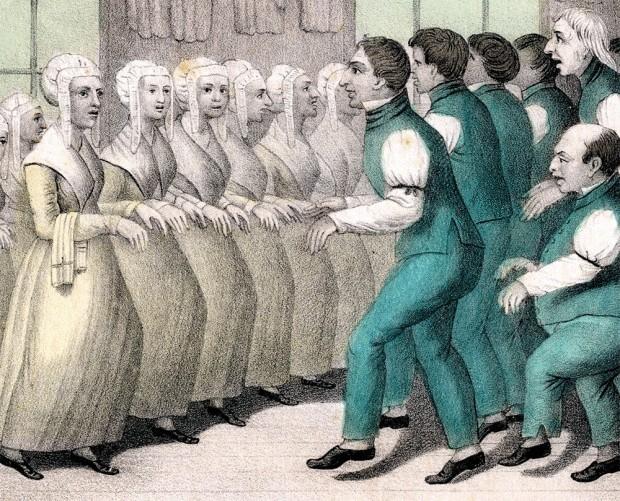
© www.americanantiquarian.or
In August 1774, the year of the English mystic named Ann Lee and her nine companions arrived in new York in determined to talk about visions about a New Eden in America. In England, these people were persecuted for their unorthodox practices and doctrines. They conducted rituals in which participants in a spiritual ecstasy came to tantrums, they danced, sang and shook. For this reason, become pejorative name of "shakers" (eng. Shake — shake). Gradually, a community of shakers began to appear in New England, in Indiana, southern Kentucky. The cornerstones of these communities were celibacy and communism. All four children Ann Lee died in infancy, and in her grief she has decided that sex is evil, and insisted on celibacy among its followers. Men and women in shaker communities lived separately, in order to avoid temptation. Their way of life was simple, life was work and prayer. Shakers were not afraid of technology and innovation. Clothespin, circular saw, and hundreds of other things are inventions of the shakers, who never came to issue them a patent.
However, the celibacy of the shakers has led to the absence of children. So their ranks, they replenish only at the expense of converts. And as America became more secular, the number of shakers inexorably declined. One of the last communities of the sect called Hancock village, she was in Massachusetts, and turned into a Ghost town in 1960-m to year. Currently it is a Museum.
Source: /users/1077

© www.americanantiquarian.or
Karl Marx outlined his theories of a classless society with common property in the pamphlet "the Communist Manifesto". In Russia, in the days of Lenin, the plan was first implemented in the whole country. However, the idea of such a society was by no means new. Throughout human history different people have organized their lives according to Communist principles.
1. Prehistoric people

© tipolog.livejournal.com
In a world where production of goods is so low that it can barely meet only the most urgent needs, people tend not to exploit each other for profit. People lived by hunting and gathering, and the basis of division of labour lay biology: physically strong men hunted while women cared for the household and raising children. Hunting was a collective activity, and the property was shared. In a world where everyone is fighting for survival, the exchange of everything necessary for survival was the norm. There was no concept of "state". No classes existed. If had quarrelled, it was a quarrel between the individual members of the tribe. The main role in resolving such quarrels were played by the elderly as they had more life experience, but they were not leaders in the usual sense of the word. Their role is well defined one leader of the Visigoths, who once said: "I Have authority but no power".
2. The Pythagoreans

© www.oursociety.ru
The Greek philosopher Pythagoras once held of the Communist experiment in Croton, in southern Italy. He combined the monastic order and the University. The Pythagoreans were mystics who believed in the harmony of the Universe. And they believed that private property could destroy the harmony, because it creates social injustice.
Pythagoras considered a grave sin, the enjoyment of wealth and comfort while others suffer deprivation. The members of the society of Pythagoras did not recognize private property and were strict vegetarians. According to Plato, Pythagoras said: "Friends share everything" and "Friendship is equality". His disciples shared even personal things, for example, Cutlery. Newcomers who came to the society, supposedly taken a vow of silence for a period of 5 years. In fact, the Pythagoreans were so secretive in everything that touched their practices and beliefs that even Pythagoras himself left no written evidence about them.
3. Sparta

© allanick.rusedu.net
Athens is considered the cradle of democracy, and the clash of the Greeks with a clearly Communist Sparta was a bit reminiscent of the rivalry between the two great powers in the 20th century. System of government in Sparta was designed in a way to create city-States United into an effective military machine. And the man was important only as a tool of the state. All Spartans considered themselves equal. Although the Spartans had a little private family ownership most of the land belonged to the state. In order to prevent the Spartans to acquire wealth, one of the reformers, Lycurgus, decided that Sparta will not be gold or silver money. Money in Sparta was iron. Because outside of Sparta, these "money" had no real value (but weighed a lot), the Spartans actually had no monetary wealth. The prohibition of wealth was pursued quite specific goal: to get people to ask for financial support to the state and not to their families. A state machine, in turn, would form them into brave warriors, fully dedicated to the state.
4. The Essenes

© Wikimedia
The Essenes is a pre-Christian Jewish sect, the communities which were located in the area of the Dead sea, and the most famous of them is called Qumran. It was there that he discovered the Dead sea scrolls. Once the Essenes separated themselves from mainstream Jewish society, because they believed that it is nothing but carnal pleasures and corruption. They considered themselves a community of the righteous, God's true elect, who devoted their lives to purity, virtue, and strict observance of the law of Moses. Their devotion to this law was so fanatical that according to the historian Josephus, they even in a toilet on Saturday did not go. It was an apocalyptic sect living in anticipation of the upcoming war between the sons of Light and sons of Darkness. Their asceticism was to prepare them for the coming conflict in which they had to take the side of Light. However, in the real world, the Essenes were pacifists, and refused to carry weapons. In their communities there were no women. All their property was in the General Fund, they openly despised wealth, while voluntary poverty was considered a virtue. Their clothes and sandals they wore as long as they don't break apart. Having servants was strictly forbidden. The community resembled a family are equal, and the leaders of the community were chosen by voting. Farming and agriculture the Essenes mastered to such an extent that could get the crop in any, even very arid region, and this harvest was enough for the whole community. They used a complex system of irrigation and the accumulated rain water stored in large tanks. The resulting harvest was transferred to a Manager and was then used by all as needed.
5. Early Christianity

© www.thejesusvirus.org
Age of primitive early Christianity was not long, as the Church quickly adapted to the economic and social structure of the Roman Empire. However, the term "communism" is quite applicable to an individual monastic orders, which were circulated in Egypt and in Asia Minor. All material assets in such order of monks usually kept together, and in General, in early Christian monasticism was hailed serious austerity, and luxury was considered worthy of contempt. But over time, in the West of SV. Benedict was allowed to make some concessions in the monastic life, and monasteries were allowed to own property. However, even then, remained the distribution of goods according to the principle "to each according to his needs." The monks wore the standard clothes made with funds from the General Fund. At the head of the monastery was the Abbot, but all the important decisions he took only after discussing them with the other monks. All monks were equal in status, whether they were of noble origin or peasant. As soon as they entered the monastery, they are, in fact, born anew, leaving behind their former worldly life.
6. The tzaddik

© Wikimedia
The tzaddik is the members of a religious movement that existed in the mid-fifth century. They sought to convert to the Zoroastrian religion of Persia, with its influential and wealthy clergy. And they were led by a priest named Mazdak, who preach social justice and equality. He taught that God created material goods to ensure that they are equally distributed among all. But because this rule was broken, and turned into the exploitation of the poor by the rich, Mazdak taught that you have to Rob the rich to help the poor, and thus restore the lost balance in the distribution of wealth. The tzaddik regularly plundered the warehouses, and gave the loot to the poor, and all kinds of threatened property of the rich. According to Mazdak, such actions were necessary and in order to fight the "Five Demons", such as Envy, Anger, Vindictiveness, Greed and Greed. Mazdak proposed to get rid of big wealth, to get rid of social differences and to create public charitable institutions. In the end, Mazdak and 3000 of his followers were captured, then Mazdak was forced to watch as his disciples buried alive, head down. And then he was hung upside down and shot with bows and arrows.
7. The Butler

Jan HUS / © czechmeout.wordpress.com
Jan HUS, a teacher at Prague University, protested against the Church, which, in his opinion, more and more engaged in worldly Affairs. He pointed to socio-economic chaos in Bohemia as one of the signs of the imminent coming of the Antichrist. His constant attacks on the Church led to the fact that he was accused of heresy and burned alive in 1415, the year. After this his followers the "Hussites", was divided into moderates and extremists, which became known as the Butler. The name comes from the town of Tabor, which they founded, and which has tried to prepare spiritually for the inevitable end of the world. Taborites sought to build a utopian society underpinned by the axiom "neither mine nor your", that is, the negation of any private property. In his article in 1420, the year the Butler made it clear: "We don't need no king, no Lord, as there should not be slavery. All taxes and other claims must cease, as no one should force someone into submission. Everyone should be equal, like brothers and sisters."
8. The Anabaptists

© holyspiritactivism.wordpress.com
The Anabaptists (meaning "baptized again") considered themselves to be elected. The radical wing of the sect sought to capture political power and establish a new society in accordance with their ideas about it. The first head of this wing was Thomas müntzer, who really was influenced by the "communism" of the Hussites, and who was willing to spread their ideology throughout Germany, even if it have to do with fire and sword. Even Martin Luther, another prominent figure of the time, the thought of Munzer extremely dangerous man. In 1525, the year munzer seized power in a town called Mulhausen, and set up a Communist regime, seizing monasteries and destroying private property. As a result, according to a contemporary, "he so influenced the people that nobody wanted to work." Communism in that situation was the justification for outright robbery. "When someone needed food or clothing he went to a rich man and demanded it all in the name of Christ, for Christ had commanded all to share with the needy. And that could not be obtained freely is taken by force. Many acted this way. Thomas [müntzer] started this robbery, and increased it every day."
9. Диггеры

The effects of civil war in England began mass unemployment and hunger due to crop failure. Against this background, economic and social instability there was a movement that advocated the destruction of private property and for ensuring the common property for all residents of Central and southern England. These agrarian Communists called themselves diggers. They tried to take away land from the nobility, and as a first step towards this goal, they proposed to remove the monarchy and create a plot of Commonwealth. In 1648, the year appeared a pamphlet calling for the destruction of the nobility, and an equal distribution of wealth. The world of the diggers was considered as a "common Treasury." Gradually, there were growing communities of the diggers, the largest of these was the community of George hill. However, the radical idea of the diggers were not recognized by the rich. They were subjected to legal harassment, boycotted them, and eventually came to direct violence. Dilerskie the settlements were burned, their culture was completely destroyed. By the end of 1650, the year of the diggers movement was finally crushed.
10. Shakers

© www.americanantiquarian.or
In August 1774, the year of the English mystic named Ann Lee and her nine companions arrived in new York in determined to talk about visions about a New Eden in America. In England, these people were persecuted for their unorthodox practices and doctrines. They conducted rituals in which participants in a spiritual ecstasy came to tantrums, they danced, sang and shook. For this reason, become pejorative name of "shakers" (eng. Shake — shake). Gradually, a community of shakers began to appear in New England, in Indiana, southern Kentucky. The cornerstones of these communities were celibacy and communism. All four children Ann Lee died in infancy, and in her grief she has decided that sex is evil, and insisted on celibacy among its followers. Men and women in shaker communities lived separately, in order to avoid temptation. Their way of life was simple, life was work and prayer. Shakers were not afraid of technology and innovation. Clothespin, circular saw, and hundreds of other things are inventions of the shakers, who never came to issue them a patent.
However, the celibacy of the shakers has led to the absence of children. So their ranks, they replenish only at the expense of converts. And as America became more secular, the number of shakers inexorably declined. One of the last communities of the sect called Hancock village, she was in Massachusetts, and turned into a Ghost town in 1960-m to year. Currently it is a Museum.
Source: /users/1077
Tags
See also
Dubious deals in history
Great people
The space race (32 photos)
A brief history of space exploration,
45 years ago, the history of "Zhiguli" + video "Small car big country"!
Horizons of utopia: 10 the manifestos about the future
25 Soviet things, which You may not remember
History of T-shirts
